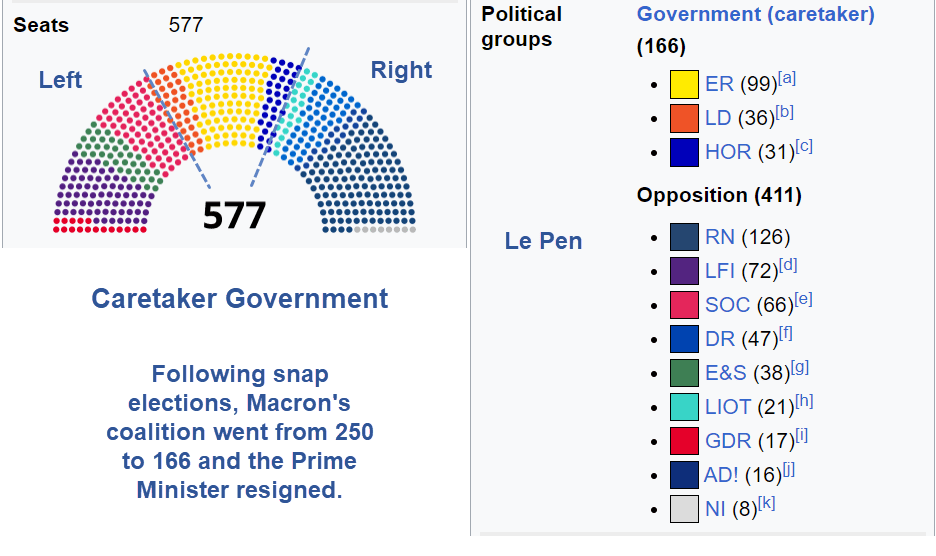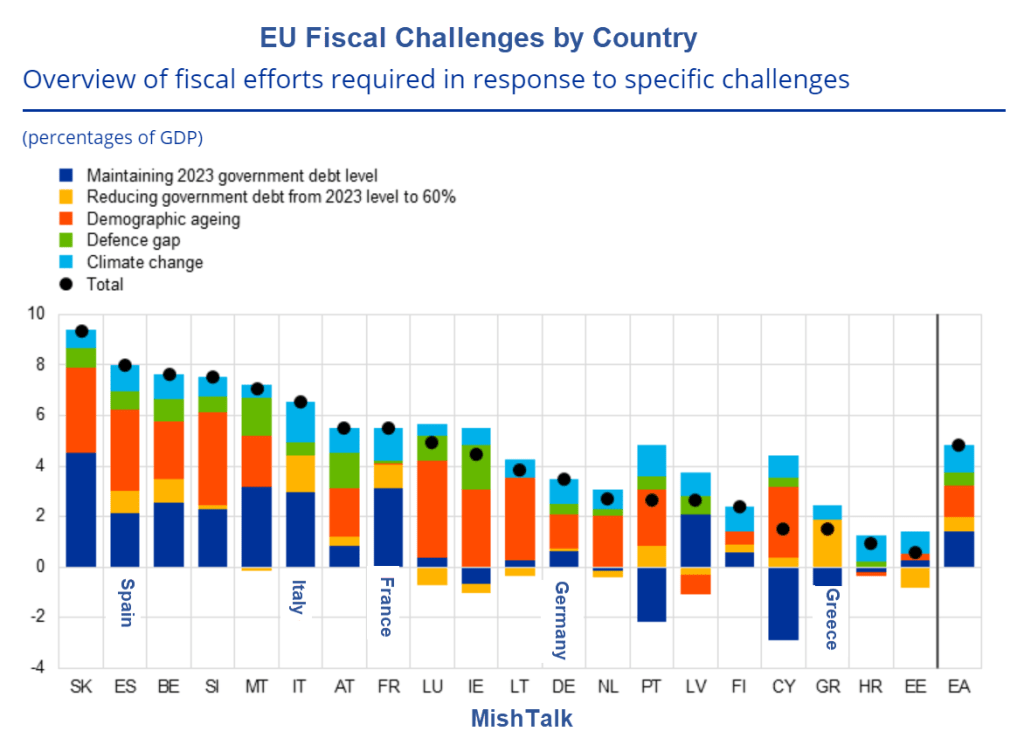A poor decision by Macron to call a snap election has made France ungovernable. Macron ponders a socialist technocrat (non-politician) to head up French domestic policy.

Le Monde reports Macron Considers New Name in Prime Minister Search.
As President Emmanuel Macron began a new round of consultations to find a new prime minister on the morning of Monday, September 2, meeting with former Socialist prime minister Bernard Cazeneuve and President of the Hauts-de-France region Xavier Bertrand, several sources mentioned the possibility of him appointing Thierry Beaudet, president of the Economic, Social and Environmental Council (CESE).
Beaudet, former president of a federation of non-profit health insurance companies and with experience working alongside business leaders and labor unions, chairs the consultative body that hosted the two citizens’ conventions (on climate and assisted dying) initiated by the French president. Trained as a primary school teacher and close to the left, he took a stand in June in La Tribune against the far-right Rassemblement National.
Le Monde has learned that the Elysée Palace has already found a chief of staff for the next prime minister: Bertrand Gaume, 49, prefect of the Nord department. Gaume, a senior civil servant with a meteoric career, has also worked for the French General Directorate for External Services (DGSE).
Macron has located a chief of staff for the next prime minister, but not the prime minister. What the heck?
Rassemblement National is Marine Le Pen’s party.
How Did We Get Here?
June 30: President Macron’s Party Blown Out in First Round of French Parliament Elections
In response to a wipeout in European Parliament elections, Macron called snap elections for parliament, not the office of president.
July 7: France is Now Ungovernable Following a Pyrrhic Victory for the Left-Green Alliance
What Happened?
The short answer is the center and left colluded to stop the right, as normally happens.
The long answer is France has a two-stage election where any party that gets 12.5 percent of the vote makes it to round two unless someone wins an outright majority in round one.
As typical in France, all but the lead or second place party drop out of the election so the Right faces a single opposition candidate.
As a result, the Left and Center kept Rassemblement National out of power.
Pyrrhic Victory
In 2022, Macron’s Ensemble governing coalition had 250 seats. MPs: 172 Renaissance, 48 MoDem and independents and 30 Horizons and those affiliated.
The coalition now has just 166 members.
Macron’s prime minister, Gabriel Attal resigned on July 7 and Macron accepted the resignation on July 16. Attal has been in a caretaker role with ever since.
France 24 Take
The far Left is upset over the process as reported by France 24.
France has been without a permanent government since the July 7 polls, in which the left formed the largest faction in a hung parliament with Macron’s centrists and the far right comprising the other major groups.
Two possible candidates for prime minister – former premier Bernard Cazeneuve from the centre left and right-wing ex-minister Xavier Bertrand – held separate meetings with Macron.
French daily Le Monde reported that 62-year-old Thierry Beaudet, head of the Economic, Social and Environmental Council (CESE) advisory body and a figure utterly unknown to most French people, was also considered for the job.
“It’s a very serious option,” a person close to Macron said. “It’s a solid, new response to the need for dialogue in society.”
To the fury of the left, Macron has refused to accept the nomination of a left-wing premier, arguing such a figure would have no chance of surviving a confidence motion in parliament.
Amid the political deadlock Macron, who has less than three years of his term remaining, has run down the clock as the Olympics and Paralympics took place in Paris, to the growing frustration of opponents.
But amid signs of an acceleration as France returns from holidays, Macron early Monday hosted Cazeneuve, a former leading Socialist who headed the government in the final months of Hollande’s 2012-17 presidential term.
Macron also held talks with Xavier Bertrand, the right-wing head of the northern Hauts-de-France region and a former minister.
Bertrand, 59, would be a much more palatable figure for the right as premier.
Sarkozy remains an influential figure on the right – despite a string of graft convictions after leaving office on charges he denies – and even within Macron’s circle, has already made his preference clear.
“The centre of gravity of French politics is on the right”, he argued in the Figaro daily on Saturday.
He said Bertrand would be a “good choice”, while opposing Cazeneuve’s nomination.
“Appointing Bernard Cazeneuve to the office of prime minister would implicitly acknowledge the fact that the ‘new world’ has failed,” Le Monde wrote in an editorial.
France’s left-wing New Popular Front alliance had demanded that the president pick their candidate Lucie Castets, a 37-year-old economist and civil servant with a history of left-wing activism.
France has a budget mess that the next prime minister will inherit.
Debt Proceedings
Please note the EU Rebukes France, Italy and Others Over Excessive Debt.
The assessments of the 27 EU states’ budgets and economies will be published by the European Commission on Wednesday, with France, Italy and Belgium among the member states to be reprimanded over their accumulated excessive new debt.
The EU suspended debt and deficit regulations to help countries cope with the economic fallout of the COVID-19 pandemic and Russia’s invasion of Ukraine.
The rules are now back in place and now any EU country going over debt and deficit limits run the risk of legal action.
Debt Brakes and Treaty Requirements
For additional details and discussion, please see Debt Brakes and Treaty Requirements About to Smash the EU.
Hoot of the Day
To achieve a government debt-to-GDP ratio of 60 percent, EU countries will have to reduce spending or raise taxes by 2 percent of GDP, on average, every year for 46 years.
That also presumes no recessions or other emergencies in that timeframe. And this is supposed to be a serious proposal.
Let’s just say it’s not going to happen.
Long Term Fiscal Issues
In addition to the Excessive Debt Proceedings against many countries, every EU county has defense spending issues, climate spending issues, and demographic issues as shown in the following chart.

The above chart is from the ECB report Longer-Term Challenges for Fiscal Policy in the Euro Area
Far Left Goals
The Front’s programme includes scrapping the 2023 French pension reform law, lowering the retirement age, increasing public sector salaries and welfare benefits, raising the minimum wage by 14 percent, and freezing the price of basic food items and energy.
France is Now Ungovernable
The above four words, describe the actual result of Macron’s “success” at keeping the Right out of power.
An October 1, deadline to form a budget looms.
No one in their right mind should want to hold the prime minister’s job right now.
Next year a similar fate awaits Germany. For discussion, please see Far Right Wins First German State Election Since WWII
